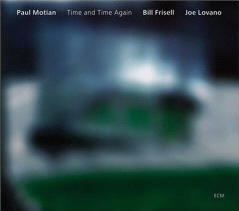Review by Brad Walseth
Subdued and introspective, this jazz supergroup trio paints with shadows. Combining guitarist Frisell's effects and folksy whimsy, saxman Lovano's bop leanings and leader Motian's free and nearly tactile drumming together seems inspired, and the results bear up to expectations. These three masters have played together in various configurations since 1981 (Lovano and Frisell were classmates at Berklee) and their work together has engendered a relaxed atmosphere where their individual energies play off one another resulting in a unique synergistic form all their own.
"Cambodia" opens the album with mysterious backward guitar effects over Motian's light drumming. Lovano's breathy sax enters and the end result resembles shimmering ripples over still, deep water. "Wednesday" follows with a strong, mostly descending 6-note motif leading to elegiac almost mournful passages. "Onetwo" features Motian's hyperactive pulse drumming, while Lovano trades notes with himself, before he and Frisell go on extended forays of sharply avant garde development.
"Whirlpool" sounds almost like a deconstruction of a long-forgotten old standard. Here Lovano holds long, low notes over which his guitar counterpart solos. Meanwhile, the haunting "In Remembrance of Things Past" melds a Spanish- style harmonic minor dirge with Motian's almost (albeit broken) military beat. "K.T." gives us a ballad-like, sentimental theme over the steady pulse of drummer/songwriter Motian. Again this sounds like a modern twist on the standards of old, which displays an almost mocking manner, yet still maintains a tender beauty, especually through Lovano's nearly cliched modulation and insouciance.
Motian is the primary songwriter, but the band finds time to offer up their own version of the Rogers and Hammerstein song from South Pacific - "This Nearly Was Mine," and cover Thelonious Monk's - "Light Blue." The latter is especially appropriate considering the respect all three artists feel for Monk's legacy and influence. Lovano also adds a challenging and rewarding piece ("Party Line") with the tenor man's string-of-firecracker lines and euphonious discord graced at the end by Frisell's chiming tones. The record ends with the title track, which is yet another prime example of an absorbing synthesis of three disparate elements into a mesemerizing totality. Mood music for those thoughtful times, "Time and Time Again" is a beautiful recording of quietude and respectful interaction that will be enjoyed by fans of any of the three of these fine musicians.
|

